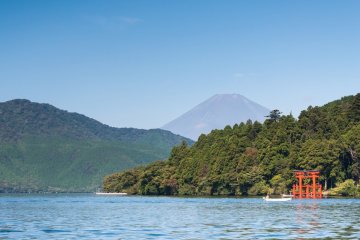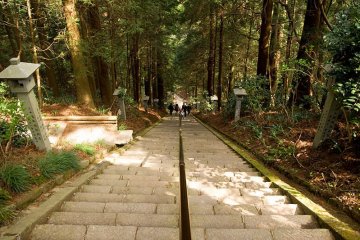
Hakone Box Burger
Box Burger 提供縣內最好的足柄牛肉漢堡。 當您點一份他們多汁的厚漢堡時,別忘了有一份手工製作的奶昔來搭配。 在這裡嘗試由京都阿拉比卡咖啡豆製成的溫哥華咖啡,它一定會為您提供能量,讓你在接下來的旅程中繼續前進!

Be awed by storm clouds of volcanic steam that gather over the active volcano, Owakudani (大涌谷), the Great Boiling Valley. Created around 3,000 years ago, today the crater-valley is a popular tourist site, despite the ominous and evocative name. The volcanic valley is still alive today with active sulfur vents and hot springs. Once called the “Grand Inferno” or “Great Hell” thanks to the streams of white sulfuric smoke reaching toward the sky, it was renamed when the Meiji Emperor and Empress visited Hakone in 1873 because locals hesitated to invite the two to a place with such a foreboding name.
Marvel from the Hakone Ropeway, 130 m above the valley bottom. Sulfur and water vapor pour out at about 100°C. The terrible landscape creates an image of hell that had even famed Japanese Buddhist monk, Kūkai, offer a prayer to Bodhisattva at the sight. At sunset, the sunlight from Lake Ashi glitters off the waters to offer a beautiful sight one might not expect next to the nightmarish landscape.
While here, be sure to try the legendary kuro-tamago—hot spring hard-boiled eggs with shells turned black by the iron sulfide in the volcanic waters—these treats are only available at Owakudani. Eating one is said to add seven years to your life. At the top of the observation deck overlooking Owakudani you might even spot the majestic Mount Fuji on a fine day, this being one of the best spots to see it from.
Access Owakudani by the Hakone Ropeway from Owakudani Station, or by bus. Although it is advised that people with asthma, bronchitis, heart disease, pacemakers, and pregnant women not enter the valley due to high volcanic activity. The volcanic gas concentration and temperature are constantly measured at the Hakone Ropeway stations to ensure the safety of guests and the site may be temporarily closed due to high levels of gas or volcanic activity.
Volcanic alerts were lifted on Friday Nov 15th 2019, ending a six-month closure that saw most parts of the Owakudani area temporarily closed to access due to an increase in volcanic gases.
The area is now safe to access, though it is advised that those with respiratory problems, heart conditions, pregnant women or young children do not enter the valley due to slight risk from volcanic fumes.
From the starting station of Hakone-Yumoto, it takes a little over half an hour to reach Owakudani Station. From Owakudani Station, visitors may ride the Hakone Ropeway to Owakudani. The Izuhakone Bus also leaves from Hakone-Yumoto Station and stops at Owakudani Visitor Center.

Box Burger 提供縣內最好的足柄牛肉漢堡。 當您點一份他們多汁的厚漢堡時,別忘了有一份手工製作的奶昔來搭配。 在這裡嘗試由京都阿拉比卡咖啡豆製成的溫哥華咖啡,它一定會為您提供能量,讓你在接下來的旅程中繼續前進!

在 Pan-no-mimi,您可以嘗試一些美味和獨特的麵包。 除了各種熱三明治,如金槍魚起司或火腿切達起司,不要忘記它們的烤麵包——例如是以烤海鮮和起司烤成的半條鮮烤麵包。

The Hakone Shrine is a Japanese Shinto shrine on the shores of Lake Ashi in the town of Hakone in the Ashigarashimo District of Kanagawa Prefecture. It is also known as the Hakone Gongen. [Wikipedia]

Over 3,000 years ago, Mount Hakone’s eruption created a large volcanic crater, leading to the formation of Lake Ashi (Ashi-no-ko) in Hakone, Kanagawa Prefecture. This stunning work of nature has become iconic thanks to its breathtaking views of Mount Fuji. On clear days visitors can see the unmistakable mountain rising above the trees and, occasionally, witness its reflection in the still waters. Surrounding Lake Ashi is a relatively undeveloped coast of lush woods and quaint onsen towns. Nestled in the forests encircling Lake Ashi are notable destinations such as Hakone Shrine, the Hakone Detached Palace Garden, and Moto-Hakone. Hakone Shrine, located on the southern end of the lake, is situated just off the shore with its red torii gate seemingly floating in the water and its similarly vibrant shrine buildings standing sheltered in the trees. Also located on the southern shores, is the Hakone Detached Palace Garden, a remnant of the summer palace for the Japanese Imperial Family. The garden, called Onshi Hakone Park, has scenic walking trails and some of the area’s best views of Mount Fuji. Nearby the garden is Moto-Hakone, which is one of the towns where boat tours often depart. Apart from the town’s port activity, Moto-Hakone is regarded as another prime location to observe Mount Fuji.

Daiyuzan Saijoji is a temple with a deep connection to the tengu, those creatures who occupy a special place in Japanese folk religion. For example, folklore has it that the tengu, in a variety of different ways, supported the Zen priest who first built Saijoji TempleThe Daiyuzan Saijoji Temple in Minamiashigara is a breathtaking temple of Soto Zen Buddhism. The temple grounds, which were built more than 620 years ago, contain around 30 ceremonial halls and other temple buildings. The temple is surrounded by an impressive cedar forest. In the temple the novices receive their formal religious training to become monks. There are 3 impressive halls on the temple grounds that are worth visiting: the Hondo, Kaisando and Myogaku halls. The temple has a deep connection to the mythical creatures of the Tengu, those creatures that have a special place in Japanese folk religion. For example, it is said in folklore that the Tengu supported the Zen priest who built the Daiyuzan Saijoji Temple in various ways.